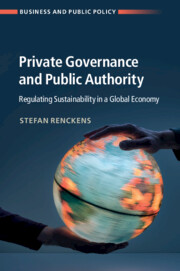Book contents
- Private Governance and Public Authority
- Business and Public Policy
- Private Governance and Public Authority
- Copyright page
- Contents
- Figures
- Tables
- Acknowledgments
- Abbreviations
- 1 Introduction
- 2 Explaining Public Interventions in Private Governance
- 3 Organic Agriculture
- 4 Biofuels
- 5 Fair Trade
- 6 Fisheries
- 7 Evaluating Public Interventions in Private Governance
- Appendix Interviews
- Endnotes
- References
- Index
1 - Introduction
Public–Private Governance Interactions
Published online by Cambridge University Press: 02 April 2020
- Private Governance and Public Authority
- Business and Public Policy
- Private Governance and Public Authority
- Copyright page
- Contents
- Figures
- Tables
- Acknowledgments
- Abbreviations
- 1 Introduction
- 2 Explaining Public Interventions in Private Governance
- 3 Organic Agriculture
- 4 Biofuels
- 5 Fair Trade
- 6 Fisheries
- 7 Evaluating Public Interventions in Private Governance
- Appendix Interviews
- Endnotes
- References
- Index
Summary
Under which conditions will a public authority intervene in private governance such as certification and eco-labeling schemes for sustainably produced goods? This chapter introduces this research question by presenting the empirical puzzle the book addresses: Why has the European Union (EU) intervened in private governance that deals with organic agriculture and biofuels, but has not intervened in private governance dealing with fair trade and fisheries? The chapter distinguishes between a public authority intervening with standards regulation that involves creating a public definition of sustainable production, and with procedural regulation that addresses the way private governance schemes are organized. The argument the book develops is that whether a public authority intervenes with standards and/or procedural regulation depends on the interplay of two variables: the domestic benefits of product differentiation by a public authority and the fragmentation of the private governance market. The chapter situates the book in the current state of the literature on the interactions between public and private governance and explains the research design and research contributions.
Keywords
- Type
- Chapter
- Information
- Private Governance and Public AuthorityRegulating Sustainability in a Global Economy, pp. 1 - 24Publisher: Cambridge University PressPrint publication year: 2020

